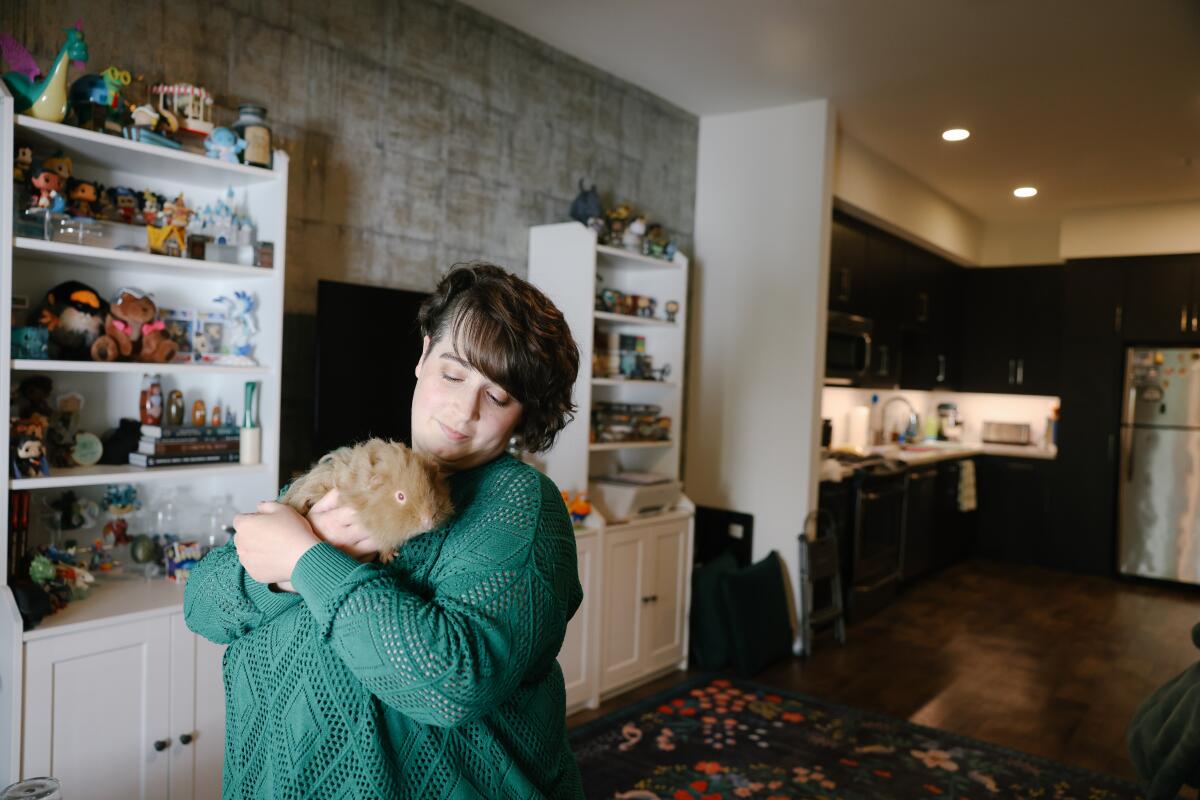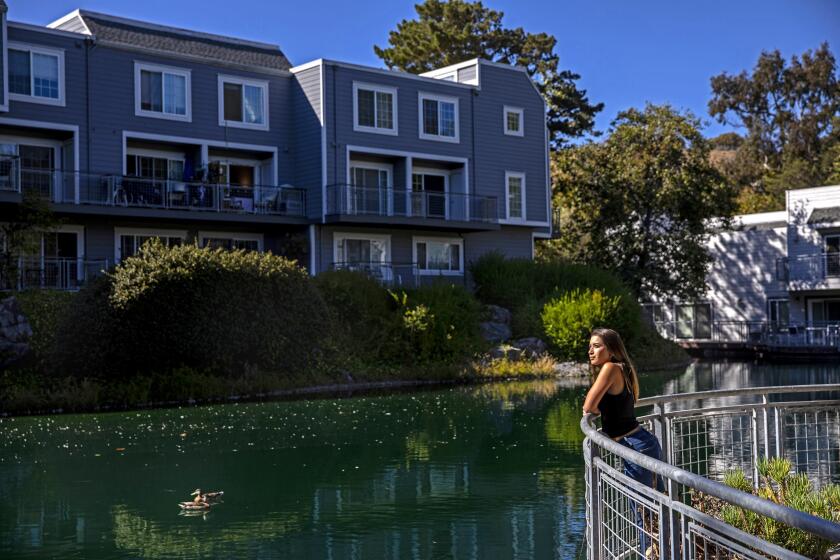Thousands of California tenants could face obscure tax bill for living in subsidized housing

- Share via
Last year, amid a drum-tight rental market, Sydney Wright pondered leaving California.
With her $72,000 salary, the thirtysomething from La Crescenta said the only one-bedroom apartments she could find were either too pricey, too run-down or in neighborhoods she felt were unsafe.
Then Wright had a change of fortune. She moved into the Hudson, a luxury apartment complex in downtown Pasadena that has a swimming pool, two gyms and in-unit washers and dryers. Wright got a relative deal and signed a lease for just above $2,300, almost $200 less than what similar units there averaged a year before even though rents in Pasadena had soared.
But it may be too good to be true.
The discount was the result of a unique program catering to middle-income earners in a state trying to chip away — project by project, program by program — at its housing crisis. And the legal knot it is tied in reflects the difficulties in taking even small steps forward.
In this program, government agencies known as joint powers authorities, or JPAs, partner with private companies to purchase apartment buildings and lower the rent. The agencies say this works because, as the government, they don’t need to pay property tax, allowing them to pass along that savings to tenants.
But, under an obscure tax rule, thousands of tenants like Wright may need to cough up some of the lost revenue and pay individual tax bills upward of $1,000 a year.
Tenants said leasing agents never disclosed such a possibility prior to moving in, and backers of the program say they didn’t anticipate it either.
“It just seems kind of ridiculous to me that you would have this crisis going on and then turn around and punish the people you are supposedly trying to help,” Wright, 32, said.
John Drachman, co-founder of Waterford Property Co., which runs the Hudson and 14 other properties on behalf of a JPA, put it more succinctly: “It’s just insane.”
The fact tenants may need to pay extra for living in subsidized housing centers on an arcane concept in tax law known as possessory interest.
Though government owned property usually is exempt from property taxes, if the government leases part of its property to a private entity, then that entity can have a “possessory” interest that must be taxed.
Examples include a rental car company at the airport, or a restaurant in a public park.
Joint powers authorities first started buying apartment complexes for middle-income housing in 2019, and one acquired the Hudson in 2021.
Attorney John Bakker represents three JPAs with such projects.
He said the agencies didn’t anticipate tenants would face possessory taxes because at the time they relied on existing guidance from a state board that he argued should be interpreted as exempting any person receiving rent breaks at the projects.
Last year, several assessors were less sure and specifically asked the state board if such projects created a taxable “possessory interest.”
In October 2022, they received a response from the state Board of Equalization, which promotes uniformity in property tax law.
In a letter, the board said residents at JPA properties do have a taxable possessory interest, but assessors should refrain from taxing it only if tenants are low-income, as defined by California law.
The board characterized its guidance as “longstanding,” which Bakker disputes.
The ultimate decision on the taxes lies with county assessors, but evidenced by their original request, assessors turn to the board for guidance and there’s no argument that the recent opinion does not offer an exemption for most residents at JPA projects.
Typically, one third of units at the projects are reserved for people making the legal definition of low-income: 80% or below area median income. The remaining two-thirds are usually set aside for households making between 81% and 120% area median income — individuals who can still struggle to find a nice home in some of the country’s most expensive markets.
Two county assessors with projects in their jurisdictions, Los Angeles and Alameda, said they don’t want to tax middle-income residents and are investigating the issue further after receiving the board’s guidance. But if the state Legislature doesn’t step in, they caution, they may ultimately decide the law requires them to tax tenants.
Los Angeles County Assessor Jeff Prang estimated annual taxes for individual tenants could range from $500 to $1,500. Initial bills may be higher since tenants would be charged for each year they’ve lived there.
If taxes go unpaid, residents would face a lien that could make it more difficult to qualify for mortgages and other loans.
For Wright, the prospect of paying an extra $1,500 a year, the equivalent of $125 extra a month, presents yet another obstacle.
Despite the rent discount at the Hudson, she said she lives paycheck to paycheck and will soon have an added expense when student loan payments resume, one Wright estimates will be more than $300 a month.
“I don’t even know how I would make it all work,” she said. “Honestly, the thought of that makes me want to cry.”
Cities such as Maywood, Bell Gardens and Cudahy are trying to address the affordable housing and homelessness crises. Landlords argue rent control will result in less housing.
JPA projects rely on a complex framework, but in general, backers say they work like this.
Joint powers authorities issue bonds to purchase a building and, with the property off the tax rolls, they use that money to reduce rent. After 15 years, the local city, which must approve the initial JPA purchase, can direct a sale of the property or take out a loan on the building to recoup lost tax revenue.
To run the deals, JPAs partner with private real estate firms that set up the bond financing and manage the projects.
The deals are not without controversy, and some cities and affordable housing consultants see the programs as risky and not worth it. In particular, the JPAs and the private real estate managers, known as project administrators, have faced criticism that their fees are excessive and thus limit the rent reductions a project can offer.
At least two county assessors, those in Orange and San Diego counties, have taken the position that project administrators, not tenants, should pay possessory interest taxes.
“These guys are making money and ... they don’t want to pay any taxes, but you got to pay your taxes,” said Orange County Tax Assessor Claude Parrish, arguing project administrators control the buildings and thus have a possessory interest.
One project administrator, Waterford Property Co., received possessory tax bills for multiple projects it runs in Orange and San Diego counties. The company is appealing, arguing it doesn’t meet the qualifications to have a possessory interest.
If the taxes ultimately go through, the middle-income projects would cease to exist, according to Waterford’s Drachman.
Despite concern over its fees, which Waterford disputes as being excessive, the annual possessory taxes are more than what the company makes each year to run the buildings, Drachman said.
One example, he said, is the Parallel apartments in Anaheim, where Waterford faces a $1.2-million annual tax bill and earns roughly $700,000 a year.
Rather than lose money, Drachman said, the company would walk away from the projects and since no one would probably run the properties at a loss, they would be sold to real estate firms that would charge market rent and erase all savings.
If instead tenants get the bill, Waterford said no future deals could be done. That’s in part because investors who buy the bonds that fund the deals do so because they think rental discounts will keep occupancy high — and their income assured.
“The group they are going to hurt the most by their actions is the renters,” Drachman said of assessors, “whether they go send them a possessory interest bill or whether they come after us and are successful.”
Prang said he doesn’t want to be an “obstacle” to creative solutions but has to follow the law, and criticized the JPAs for not consulting assessors before.
Prang said he is waiting on an opinion from the county counsel about whether taxing project administrators is an option, but warned the county Board of Supervisors in March that he may have to tax middle-income tenants.
“We are trying to find a solution” to not do that, Prang said in an interview. “But one of the things slowing that down is having a firm legislative proposal and a legislator that is willing to run with it.”
The California Assessors’ Assn. recently agreed to ask state legislators to clarify that project administrators — not tenants — have a possessory interest, according to the group’s president, Kristine Lee.
So far Sacramento’s efforts to exempt middle-income tenants have stalled. Two measures aimed at doing so, Assembly Bill 1553 and Senate Bill 320, are dead for the year after failing to meet legislative deadlines.
Alternatively, a third bill that specifically leaves middle-income tenants open to possessory taxation advanced to the Assembly after passing the Senate unanimously.
The measure, Senate Bill 734, codifies existing Board of Equalization guidance by exempting only low-income tenants.
According to a bill analysis, author Sen. Susan Rubio (D-Baldwin Park) said the legislation is necessary because despite the tax board’s guidance, “existing law is ambiguous” as to whether low-income tenants actually are exempt.
The bill, which must pass the Assembly by mid-September, is supported by the Board of Equalization and opposed by some cities that have middle-income housing projects.
In a letter to Rubio, Pasadena Mayor Victor Gordo said the city has nearly 1,100 units in its JPA housing projects and rent has been reduced by an average of 20%.
“If SB 734 passes as drafted, 60% of the tenants in these units are eligible to receive possessory interest tax bills, which we do not believe is in the best interest of housing policy in California,” Gordo wrote.
Overall, Bakker said JPAs own about 14,000 units across California, with around 9,000 currently home to middle-income families or reserved for such households in the future.
Rubio’s office declined to answer several specific questions about the bill, including why it does not exempt middle-income tenants. In a statement provided by her spokeswoman, the senator said she is trying to “keep families housed” and is working closely with the Board of Equalization on the measure.
Board Chairman Antonio Vazquez said he doesn’t support extending an exemption to middle-income individuals, at least for now.
“I think we have to be careful, because that would create a huge hit financially for cities and counties who depend on the revenue [from property tax],” he said.
Waterford executives dispute that taxing individual tenants would recoup a sizable amount of revenue, but Vazquez’s concern echoes long-running criticism of the JPA housing model, specifically that rent reductions are too modest to justify the loss in property tax.
A new program involving local subsidies aims to help middle-income Californians afford better housing. Critics say it’s a bad use of public funds.
For example, the JPAs have frequently purchased newer, luxury apartment buildings and, though they’ve lowered rent, there’s often cheaper, older housing nearby.
Wright now pays just over $2,400 in rent at the Hudson after receiving the allowable annual increase in the program.
That’s far less than the roughly $2,800 to $3,000-plus that similar, nearby buildings typically charge. But on a recent day, there were 53 older one-bedroom apartments in Pasadena listed for rent on Zillow that were at least $200 cheaper than what Wright pays.
If Wright gets hit with possessory taxes, she doesn’t see those older units as a simple solution.
For one, she said, she doesn’t have enough money to cover upfront moving costs.
She also chose the Hudson for a reason.
The program is supposed to keep rent in line with her income. And when the tax preparer works late into the night during tax season, she doesn’t need to hunt for street parking when she comes home. She can pull into her own secure spot and do the next day’s laundry in the comfort of her apartment.
Older units she saw seemed like temporary landing pads with broken sinks, worn carpets and shoddy paint jobs, but the Hudson feels more permanent.
“I deserve to have a place to call home and not constantly be in flux,” Wright said. “This felt like somewhere I could see myself living.”
More to Read
Sign up for Essential California
The most important California stories and recommendations in your inbox every morning.
You may occasionally receive promotional content from the Los Angeles Times.
















